Bay Leaf Tea: Health Benefits, Risks, and How to Make It
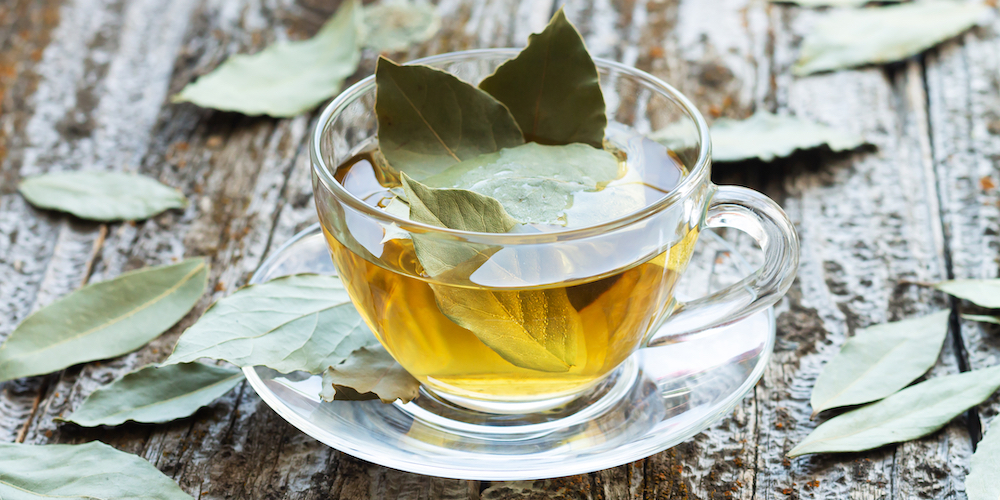
Most people know bay leaves as a common herb used in cooking. But this culinary herb is also known for its age-old medicinal properties and various health benefits. Bay leaf tea is a good source of vitamin A, vitamin B6, and vitamin C. While there are many claims are made about the benefits of bay leaf tea, not all have been proven.
In this blog post, we’ll take a closer look at the potential health benefits of bay leaf tea, as well as some of the risks associated with it. We’ll also show you how to make your bay leaf tea at home!
Table of Contents
- Benefits of Bay Leaf Tea
- 1. Can Aid Sinus Infection & Migraines
- 2. Bay Leaf Tea for Sleep and Insomnia
- 3. Bay Leaf Tea for High Blood Pressure
- 4. May Aid Weight Loss
- 5. Bay Leaf Tea for Diabetes
- 6. Can be Good for a Cough
- 7. Bay Leaves Tea for Arthritis
- 8. Bay Leaf Tea Benefits for Skin
- 9. Bay Leaf Tea for Hair
- Bay Leaf Tea Side Effects
- How to Make Bay Leaf Tea
- Conclusion
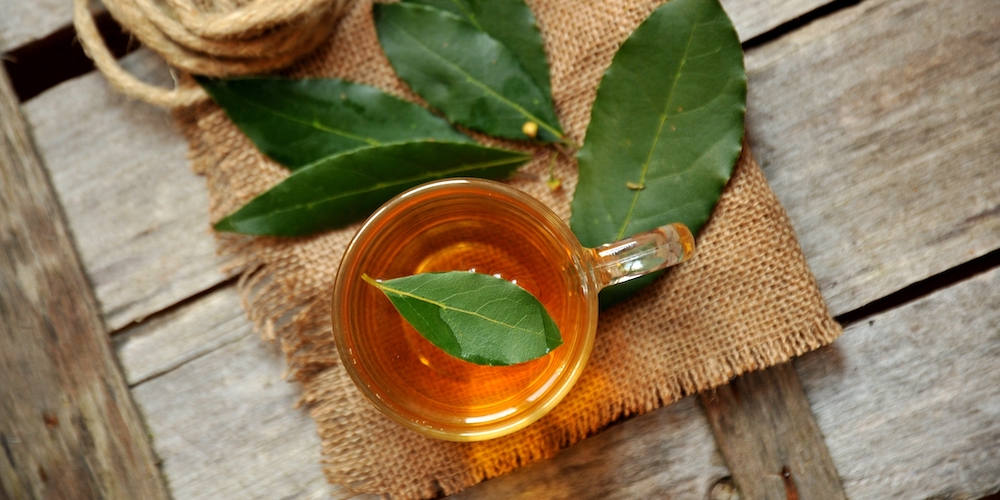
Benefits of Bay Leaf Tea
There are many potential health benefits associated with drinking bay leaf tea. It makes a good choice for those looking to improve their digestive health. For instance, this herbal tea can help to relieve indigestion, gas, and bloating. It may also help to prevent or treat constipation.
The antioxidants present in bay leaf tea may also offer some protection against chronic diseases like heart disease. These substances help to scavenge harmful toxins and byproducts that can damage cells, leading to inflammation.
Preliminary research suggests that compounds in bay leaves may also help to manage blood sugar levels.
1. Can Aid Sinus Infection & Migraines
A sinus infection is an inflammation of the lining of the sinuses. It can be caused by a virus, bacteria, or allergies. Symptoms include headaches, congestion, runny nose, and facial pain.
There is some evidence to suggest that bay leaf tea may help to treat sinus infections. A study in rats found that a compound called eugenol, which is present in bay leaves, was effective in reducing inflammation.
Also, migraines can benefit from bay leaves tea, a type of headache that is often accompanied by nausea, vomiting, and sensitivity to light. Some research suggests that eugenol may help to reduce the severity of migraines.
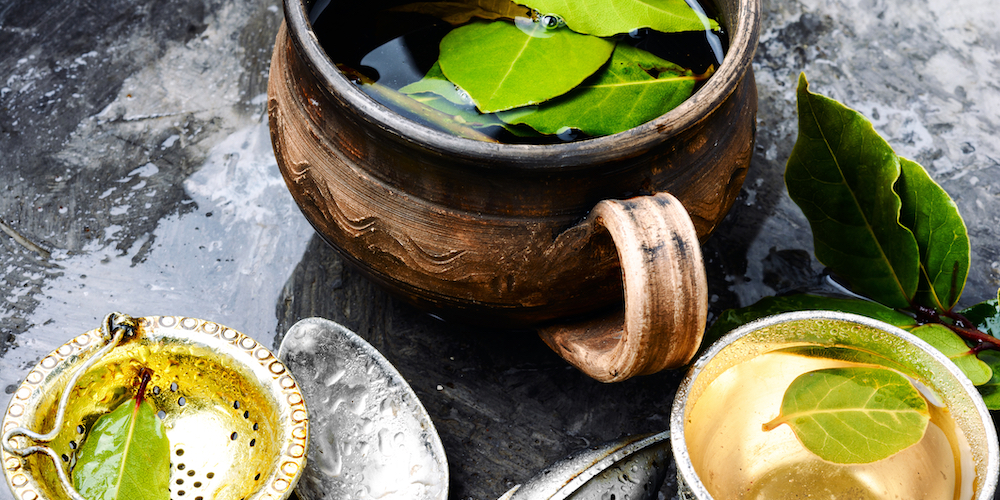
2. Bay Leaf Tea for Sleep and Insomnia
Insomnia is a sleep disorder that makes it difficult to fall asleep or stay asleep. It can cause fatigue, irritability, and difficulty concentrating.
There is some evidence that compounds in this herbal tea may help to promote sleep. A study found that a compound called linalool, which is present in bay leaves, increased the amount of time an individual slept.
Lifehacker reports that bay leaves are the perfect solution for those who can’t seem to get enough sleep. They contain natural oils which help calm down your brain’s functioning, making it easier than ever before! Just make a cup of bay leaf tea before bedtime and enjoy some well-deserved rest – you’ll be glad you did
You could also try Lavender Tea
3. Bay Leaf Tea for High Blood Pressure
High blood pressure is a condition in which the force of your blood against your artery walls is too high. This can lead to heart disease, stroke, and kidney problems.
Bay leaf tea is a great way to get your daily dose of potassium, an important nutrient for heart health. This powerful plant extract also contains antioxidants and iron that help protect against free radicals in the body which can cause damage or disease at cellular levels
The journal Clinical Biochemistry and Nutrition published a study which found that consuming one to three grams of bay leaves per day was associated with 26% lower cholesterol levels. Further research is needed, but this suggests it may be worth trying out for those who are looking for an ancient natural remedy as part of their healthy lifestyle plan!
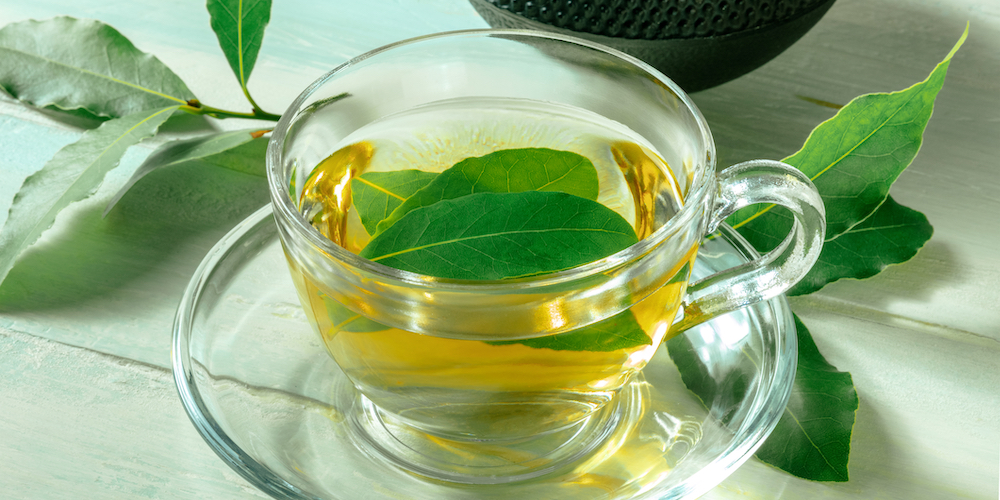
4. May Aid Weight Loss
Bay leaves are an excellent source of fibre that helps you feel full and improves your bowel movements, which is essential in weight management.
The bay leaf also can prevent overeating or bingeing on unhealthy food because it keeps stomachs feeling full during meals. This way we can enjoy our meal without having any negative effects from too many cookies!
When your digestive system is working at its best, what you eat will be better absorbed by the body. Bay leaves can help with that and also prevent weight increases by keeping blood sugar levels balanced. This is essential for people who are struggling with diabetes or insulin resistance.
5. Bay Leaf Tea for Diabetes
Diabetes is a condition in which the body cannot properly use and store glucose (a type of sugar). Glucose backs up in the bloodstream, causing damage to nerves and organs.
There are two main types of diabetes: type 1 and type 2. Type 1 diabetes is usually diagnosed in children or young adults, while type 2 diabetes is more common in older adults.
The Journal of Clinical Biochemistry and Nutrition recently published a study on the effects of consuming bay leaves for 30 days. The results showed that it helped people suffering from Type-2 diabetes, improve insulin function.
It also reduces glucose levels in patients with high cholesterol or obesity problems. This is due to its hypoglycaemic effect which is caused by phytochemicals found within this plant!
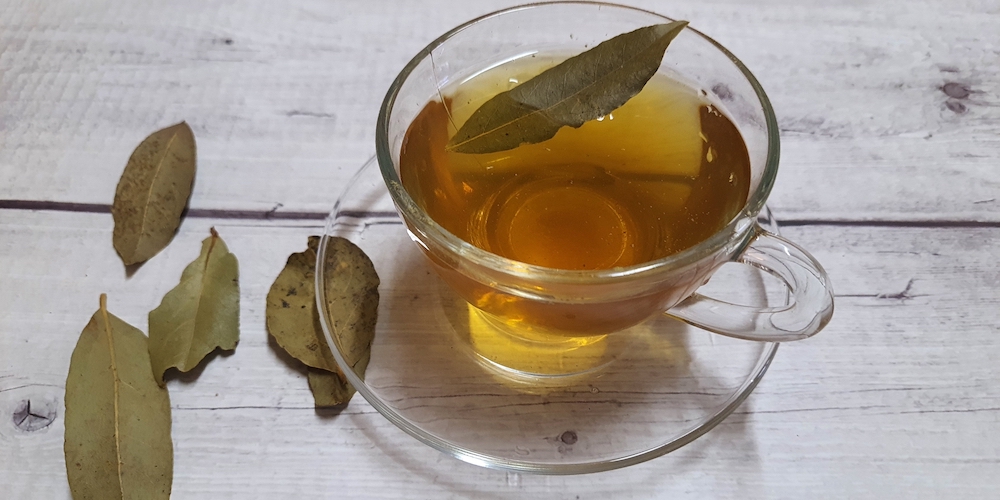
6. Can be Good for a Cough
A cough is a reflex that helps protect your lungs by clearing your airway of irritants. Coughing is the body’s way of getting rid of mucus, phlegm, dust, or anything else that doesn’t belong in the lungs.
While a cough can be annoying, it’s usually not a cause for concern. However, if you’re coughing up blood or your cough is accompanied by shortness of breath, chest pain, or other concerning symptoms, it could be a sign of a more serious problem and you should see a doctor.
The properties of bay leaves help to relieve mucus buildup and congestion in the chest. This can help to clear your airways and make it easier to breathe.
Bay leaves also contain expectorant properties that help to thin mucus so that it can be expelled more easily. This is especially helpful if you’re suffering from a productive cough.
7. Bay Leaves Tea for Arthritis
Arthritis is a term that describes around 200 conditions that cause pain in the joints and the surrounding tissues. The most common type of arthritis is osteoarthritis, which affects around 32.5 million adults in the United States alone!
Bay leaf tea can help to reduce inflammation and pain associated with arthritis. This is due to the presence of anti-inflammatory compounds such as eugenol and linalool.
A study published in the journal BMC Complementary and Alternative Medicine found that participants who consumed bay leaf tea for six weeks had significantly lower levels of pain and stiffness than those who didn’t drink the tea.
The study also found that those who drank bay leaf tea had improved physical function and were able to perform daily tasks more easily.
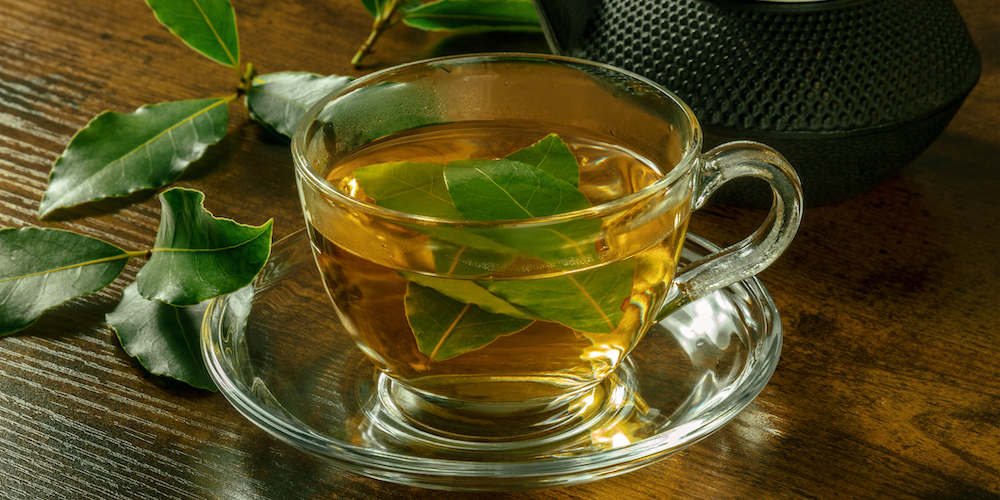
8. Bay Leaf Tea Benefits for Skin
The antioxidants present in bay leaves can help to protect the skin from damage caused by free radicals. Free radicals are unstable molecules that can cause cell damage, leading to premature ageing and a host of other problems.
Bay leaf tea can also help to reduce inflammation and soothe irritated skin. This is due to the presence of compounds such as eugenol and linalool, which have anti-inflammatory properties.
Drinking bay leaf tea can also help to improve hydration and make your skin look more radiant. This is because it helps to promote healthy circulation and detoxifies the body.
To enjoy the benefits of bay leaf tea for your skin, simply drink a cup or two every day. You can also apply a cooled, wet tea bag to any areas of inflammation or irritation.
9. Bay Leaf Tea for Hair
Bay leaves are often used in hair care products because they can help to promote healthy hair growth. This is due to the presence of compounds such as eugenol and linalool, which have anti-inflammatory properties.
These compounds can help to reduce scalp inflammation and soothe irritated skin. This can lead to healthier hair follicles and stronger, faster-growing hair.
The antioxidants present in bay leaves can also help to protect the hair from damage caused by free radicals. Free radicals are unstable molecules that can cause cell damage, leading to premature ageing and a host of other problems.
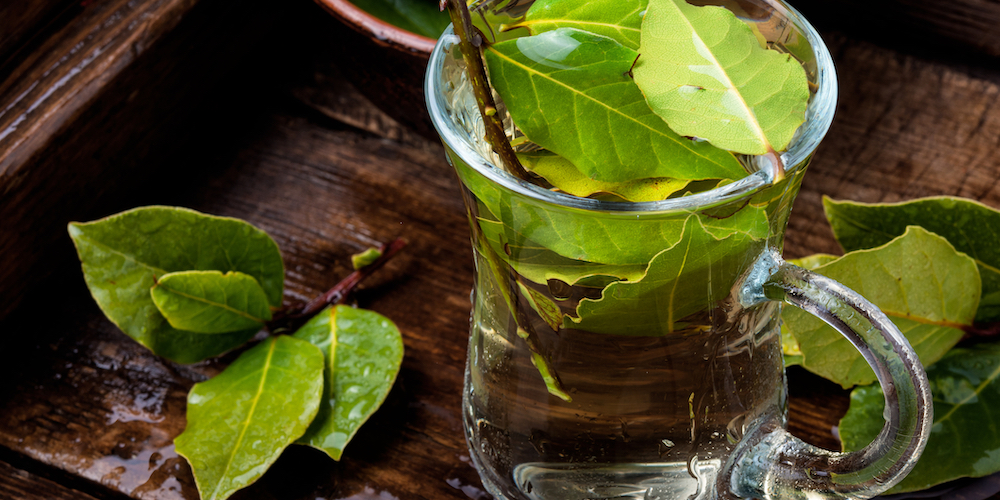
Bay Leaf Tea Side Effects
While bay leaf tea is generally safe for most people, there are a few potential side effects that you should be aware of.
The most common side effect is heartburn or indigestion. This is because bay leaves can relax the lower oesophagal sphincter, which can allow stomach acid to escape and cause irritation.
If you suffer from GERD or other digestive problems, it’s best to avoid bay leaf tea.
Another potential side effect is nausea. This is usually only a problem if you consume large amounts of bay leaf tea. If you do experience nausea, it’s best to stop drinking the tea and see how you feel.
Finally, some people may be allergic to bay leaves. If you experience any adverse reactions after drinking bay leaf tea, it’s best to stop drinking it and see a doctor.

How to Make Bay Leaf Tea
Making bay leaf tea is easy! Simply add a few bay leaves to a teapot or cup of hot water and let them steep for 5-10 minutes.
You can also add other ingredients such as honey or lemon to taste.
If you’re using fresh bay leaves, you’ll need to use 2-3 times as many as you would dried leaves. You can also bruise the leaves slightly before adding them to the water to help release their flavour.
Once the tea has finished steeping, strain it and enjoy!
Does Bay Leaf Tea have Caffeine: No, bay leaf tea does not contain caffeine.
Tasting Notes: Bay leaf tea has a slightly bitter, astringent taste.
Conclusion
Bay leaf tea is a delicious and healthy drink that offers a range of potential benefits. These include improved skin and hair health, better digestion, and reduced inflammation.
While bay leaf tea is generally safe for most people, there are a few potential side effects that you should be aware of. If you experience any adverse reactions after drinking bay leaf tea, it’s best to stop drinking it and see a doctor.

 Loose Leaf Tea
Loose Leaf Tea Pyramids
Pyramids Tea Bags
Tea Bags Africa
Africa Assam
Assam Ceylon
Ceylon Chinese
Chinese Darjeeling
Darjeeling European
European Indian
Indian Japan
Japan Nepal
Nepal South East Asia
South East Asia Ayurveda Tea
Ayurveda Tea Black Tea
Black Tea Chai Tea
Chai Tea Flowering Tea
Flowering Tea Fruit Tisanes
Fruit Tisanes Green Tea
Green Tea Herbal Tea
Herbal Tea Matcha Tea
Matcha Tea Oolong Tea
Oolong Tea Organic Tea
Organic Tea Pu erh Tea
Pu erh Tea Rooibos Tea
Rooibos Tea White Tea
White Tea Asian Coffee
Asian Coffee Caribbean Coffee
Caribbean Coffee Central American Coffee
Central American Coffee South American Coffee
South American Coffee Coffee Blends
Coffee Blends Decaffeinated Coffee
Decaffeinated Coffee Espresso Coffee
Espresso Coffee Ethically Sourced Coffee
Ethically Sourced Coffee Flavoured Coffee
Flavoured Coffee Organic Coffee
Organic Coffee Single Origin Coffee
Single Origin Coffee Chocolate 1
Chocolate 1 Chocolate 2
Chocolate 2 Chocolate 3
Chocolate 3 Chocolate 4
Chocolate 4 Chocolate 5
Chocolate 5 Chocolate 6
Chocolate 6 Chocolate 7
Chocolate 7 Chocolate 8
Chocolate 8 Chocolate 9
Chocolate 9 Loose Tea Filters
Loose Tea Filters Tea Accessories
Tea Accessories Tea Bricks
Tea Bricks Tea Caddies
Tea Caddies Tea Caddy Spoons
Tea Caddy Spoons Tea Gift Ideas
Tea Gift Ideas Tea Infusers
Tea Infusers Tea Strainers
Tea Strainers